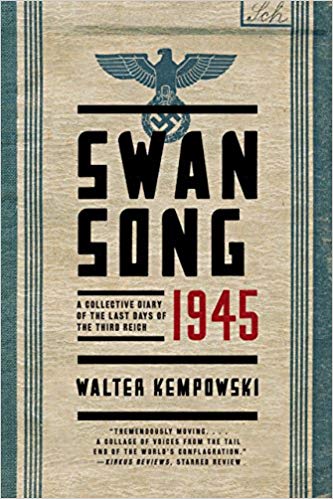Background
Walter Kempowski was born on April 29, 1929, in Rostock, Germany. He was a son of Karl Georg Kempowski, a shipping company owner, and Margarethe (Collasius) Kempowski, a teacher and homemaker.

1990
Kempowski and his wife Hildegard are paying a visit to the University of Rostock, 1990.
Walter Kempowski with Karl Lieffen during the filming of "Tadellöser & Wolff" in the 1970's.
Walter Kempowski signing a book.













(This is a monumental work of history, that captures the l...)
This is a monumental work of history, that captures the last days of the Third Reich as never before. This book chronicles the end of Nazi Germany through more than 1,000 extracts from letters, diaries and autobiographical accounts, written by civilians and soldiers alike. Together, they present a panoramic view of four tumultuous days of that fateful spring: Hitler’s birthday on April 20, American and Soviet troops meeting at the Elbe on April 25, Hitler’s suicide on April 30 and the German surrender on May 8.
http://www.amazon.com/gp/product/B00NUB4FE8/?tag=2022091-20
2015
Walter Kempowski was born on April 29, 1929, in Rostock, Germany. He was a son of Karl Georg Kempowski, a shipping company owner, and Margarethe (Collasius) Kempowski, a teacher and homemaker.
In 1935, Walter started to attend St. Georg School in Rostock. In 1939, he transferred to the local high school. Later, in 1960, Kempowski graduated from a teaching college in Gottingen, Germany.
In 2002, Walter was named an Honorary Doctor of the University of Rostock.
In early 1945, as war fortunes grew increasingly worse for Germany, the Nazi army drafted Kempowski as a courier, though he was not yet sixteen years old. When the forces of the Soviet Union took Rostock, Walter Kempowski temporarily relocated to the part of Germany, occupied by the United States, but three years later, he returned to Rostock because of homesickness. Not long afterwards, Kempowski and his brother Robert were arrested by the Soviets as spies. Not long after that, their mother was also arrested. She spent a little under six years in a women’s work camp. Walter and Robert spent eight years in a similar facility for men.
Upon his release, Walter Kempowski determined he would become both a teacher and a writer and enrolled in a teachers’ college in Goettingen. By 1960, he had obtained his first school position. Walter's first book, "Im Block", was a factual account of his years in the Soviet prison camp and was published in 1969. However, the book did not do well commercially.
Kempowski’s next book, though based on factual events in his family’s history, was fictionalized into novel form. "Tadelloeser & Wolff", published in 1971, takes its title from an untranslatable, yet joyous exclamation, habitual to Kempowski’s father, and the story begins in 1939 when Kempowski was ten years old. For the most part, he gives the characters the real names of the family members, who inspired them, including himself. The tale spans from the Kempinski's’ celebratory move into a larger apartment to the end of World War II when Rostock is invaded by the Soviets.
In the following years, Walter continued to publish a series of books about the history of his family, called "Deutsche Chronik" ("German Chronicle"), which became longtime best sellers in West Germany. In the 1980s, he began the largest collection of diaries of common people in Germany, leading to the gigantic book project "Echolot" ("Echo sounder") about the last months of World War II by contemporary witnesses, published in the 1990s.
During his lifetime, Kempowski also acted as an editor and compiler. In "Did You Ever See Hitler?: German Answers", he collected the anonymous answers and anecdotes of 230 people with whom he talked during his travels throughout Germany. In "lmmer so durchgemogelt", which means "Always Tricked My Way Through", Walter recorded similar recollections from anonymous German interviewees about their primary schooling.
Walter Kempowski was a renowned writer, playwright and educator, who gained prominence for his series of novels, called "German Chronicle" ("Deutsche Chronik") and the monumental "Echolot", a collage of autobiographical reports, letters and other documents by contemporary witnesses of the Second World War.
During his lifetime, he received many prizes and awards, including Lower Saxony Prize in 1979, Bambi Award in 1980, Radio Play Prize of the War Blinded in 1981, Order of Merit of the Federal Republic of Germany and others. Also, in 2007, Walter was named an Honorary Doctor of the University of Rostock.
In June 2007, the Society of Walter Kempowski was established in Giessen.
(This is a monumental work of history, that captures the l...)
2015(This work represents studies in German Literature, Lingui...)
1988Walter was a member of PEN International. In his youth, he also was a member of Hitler Youth organization. Within the Hitler Youth, Kempowski was valued for his musical talent and often helped provide entertainment at the group’s larger events.
Quotes from others about the person
"Walter was not an athletic child, but instead inherited the parents’ artistic interests: he played the piano and the organ, went to concerts with his mother and read voraciously." — Patricia H. Stanley
Walter married Hildegard Janssen, a teacher, on April 20, 1960. Their marriage produced two children — Karl-Friedrich and Renate.
